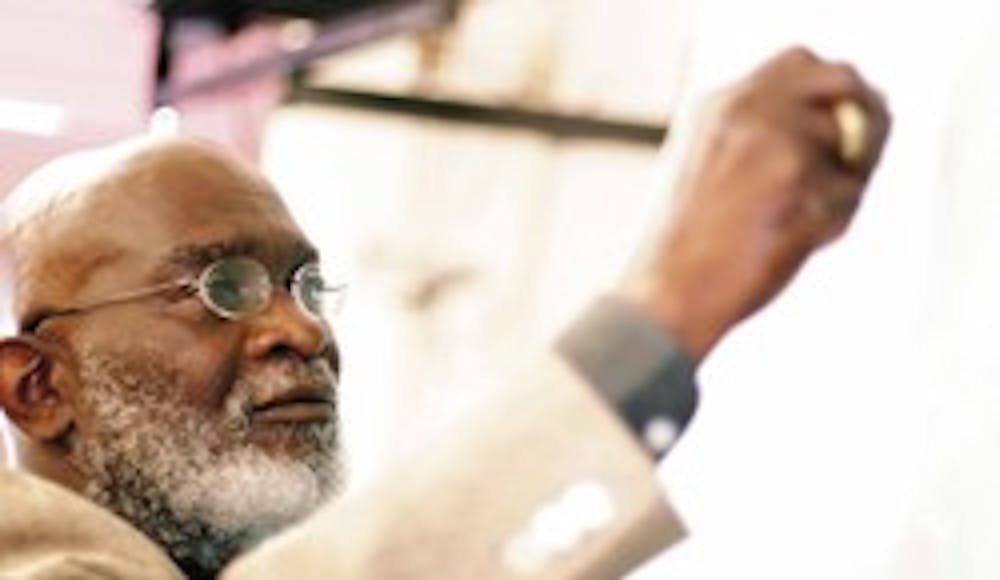by Eva Dameron
Daily Lobo
UNM professor Shiame Okunor, who retires
in June, grew up in Ghana with a passion
for education.
"There's always the drive to get educated,"
Get content from The Daily Lobo delivered to your inbox
he said. "When I was growing up, there
was only one university. It is the cream of
the cream that can make it into the university."
He said most people in Ghana look to
schools abroad for better educational opportunities.
With experience as a scriptwriter for
a television company in Ghana, he chose
New York University to study television
production. Okunor said television was a
field that provided a lot of opportunities in
his country.
He planned to return home when he
was done with his schooling in the United
States.
Couldn't go back
While Okunor was in New York, Ghana's
government was overthrown by the military.
He couldn't go back because the country
was growing more and more unstable
with governments splitting and continually
overthrowing each other. After two years,
he transferred to Graham Junior College in
Boston.
"I was sitting in the lounge of that college
when a friend of mine walked by with a
University of New Mexico catalog," he said.
"I looked at it, and I said, 'Oh, wow, that
must be a nice place for me to go.'"
His philosophy professor encouraged
him to go, telling Okunor that if he really
wanted to see America - feel the pulse of
America - he should go to Albuquerque.
Okunor came to UNM in 1971 and started
teaching a couple years later.
Last year, he stepped down from his
nearly 20-year run as Director of African
American Studies.
Teaching students to think
Okunor creates all of his own classes at
UNM.
He doesn't want his students taking notes.
He said it is more important to
teach students how to think for
themselves.
"One of my biggest challenges
sometimes is in some of my classes,
I tell my students not to take notes,"
he said. "They panic. I say, 'If you
listen carefully to what I'm saying,
you will retain it.'"
Okunor said he divorces his students
from the idea that their papers
must reflect what they think he will
want to hear.
Marcus Smith is a student in Okunor's
Roots class.
"He'd rather us pay attention
and have us think about it intellectually
than having to write it on
a piece of paper," Smith said. "So,
rather, you think about it, and let it
manifest in your head."
Smith had Okunor last semester
and liked him so much that he decided
to take one of his classes again.
"He taught me a lot of just being
me," he said. "I give him my input,
and we just sit there and talk about
it, have a discussion about life.
Things like that I think is beyond
just teaching."
Breaking down stereotypes
Every summer Okunor takes eight
to 15 students to Ghana. They stay in
residential areas and visit palaces.
They bring school supplies for families
that otherwise can't afford them.
"Then we go to what I call the
genesis of America - we go to
slave castles," he said. "We intellectualize
slavery."
Okunor said it's one thing to read
about slavery.
"But now you are in the physical
presence, the prison cell, and you
start to think of contradictions," he
said.
Okunor said the slaves were kept
on one floor while church services
were performed on the floor above.
He said the main point of the trip
to Ghana is to break down stereotypes
students have about Africa.
On the weekends when Okunor
isn't teaching, he drives two-anda-
half hours to a church he owns in
Gallup, N.M. He's been an ordained
minister there for the past eight or
nine years, he said. The church is
mostly for homeless women.
"We hold regular services, and
then at the end of the service, we
feed them," he said. "We all sit at
tables and we eat, and then we have
clothes they can pick through."
Sad to see him go
In 2004, Okunor won the Faculty
Teaching Award and used the
$1,500 award money to start a library
in his hometown of Adabraka
in Ghana. He turned his families
old home into the library.
"A library that is just for the community
is not there," he said. "Within
the last two years, I've collected a
bunch of books and pumped a whole
bunch of money into renovating the
place."
He said he might not miss
teaching because he's so involved
in establishing the library.
He has sent 25 to 30 boxes of
books over, or about half of his inventory.
He said he's trying to raise
funds to send the rest of the books.
He also wants to have newspapers
for the adults, and free tea and movie
nights for the neighborhood kids.
Letha Allen, department administrator
at African-American Studies,
said Okunor was popular among
students.
"That guy has been awesome - I
grew tremendously under him,"
Allen said. "I'm happy for him, but
I'm sad to see him go because his
retiring is going to leave a great
void in this program. He will defi-






